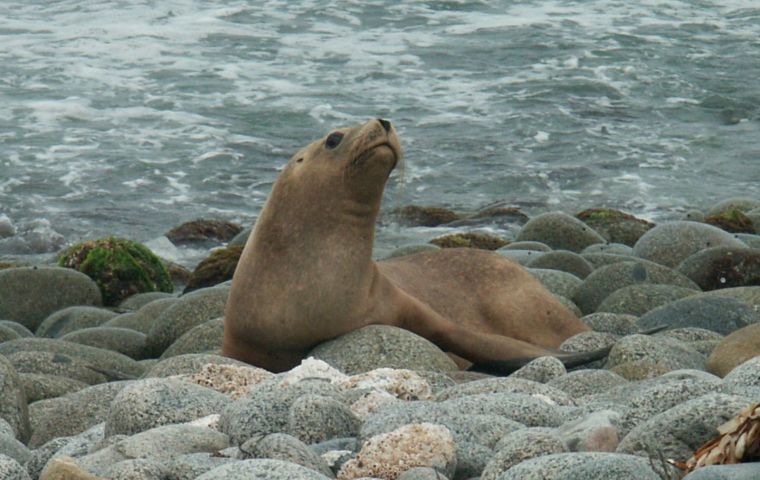MercoPress. South Atlantic News Agency
First case of sea lion dying of avian flu confirmed in Uruguay
 Tesore told El País that these animals take advantage of buildings to seek refuge, especially on cold days
Tesore told El País that these animals take advantage of buildings to seek refuge, especially on cold days Uruguayan authorities said the first case of a sea lion with avian influenza had been detected in the country after a specimen was found dead on the Cerro beach on Aug. 31 and the laboratory tests were announced Tuesday, it was reported in Montevideo.
The Ministry of Livestock, Agriculture, and Fisheries (MGAP) also confirmed it was the first case of the malady in a wild mammal. Several birds had been arriving at the Uruguayan shores with symptoms that suggested avian influenza, which hit other parts of the world and which, in the last few weeks, caused hundreds of deaths on the Atlantic coast of Argentina.
Marine fauna experts in Uruguay are concerned that the avian flu virus could cause hundreds of deaths in Isla de Lobos, in Maldonado, or Cabo Polonio, in Rocha.
National Aquatic Resources (Dinara) Director Jaime Coronel said the country has “the largest colony of sea lions in South America” and that the entry of avian influenza would entail “the possibility of a reduction in the populations of sea lions...”
Also on Tuesday afternoon, specialists began receiving videos of sea lions convulsing -one of the symptoms of this virus- on local beaches. A small sea lion was also filmed getting into the fountain in the garden of a building in the Montevideo district of Punta Gorda, and the organization Rescate Fauna Marina (RFM) published the recording.
RFM's Richard Tesore told El País that these animals take advantage of buildings to seek refuge, especially on cold days.
“In Punta del Este we have had sea lions walking along Gorlero. We have had pups sleeping in the Punta del Este bus terminal, sleeping under the buses,” explained Tesore.
In this scenario and following the cases detected in Argentina, the MGAP advised people “to avoid direct contact” with specimens either dead or alive.
In case of finding specimens of these species with the corresponding symptoms or dead, notify the National Directorate of Aquatic Resources (Dinara) and the General Directorate of Livestock Services of the MGAP (infodinara@mgap.gub.uy), the authorities also recommended. Coronel also said that N1 flu can be easily contagious to humans.
At least ten cases of dead animals have appeared on the coasts of Montevideo, Canelones, and Maldonado. Test results on these particular samples are yet to be announced.




Top Comments
Disclaimer & comment rulesCommenting for this story is now closed.
If you have a Facebook account, become a fan and comment on our Facebook Page!